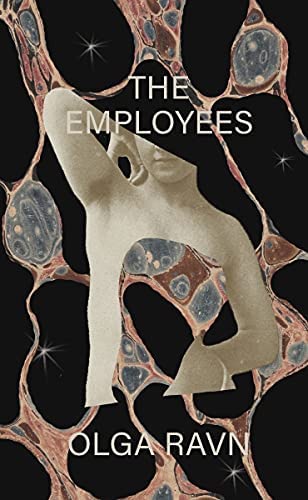by Nicole Yurcaba

Perhaps Olga Ravn’s The Employees arrives to literary audiences at the perfect time. The COVID-19 pandemic arrived and brought with it The Great Resignation, a trend which delivered over 47 million resignations to the American job market in 2021. The Pew Research Center established three main reasons for The Great Resignation: low pay, no advancement opportunities, and disrespectful workplaces. Since then, “quiet quitting” has become a phenomenon gripping employees and employers alike. Is it any surprise then that a novel like The Employees might resound loudly with audiences despite its brevity?
In The Employees, readers board the Six-Thousand Ship, where humans and humanoids cohabitate and document their frustration with their daily tasks via a series of memos and reports. After the crew take on numerous, strange objects from the planet New Discovery, the crew change, develop an affection for the objects, and start experiencing emotions they cannot name and are not programmed to experience. Tensions between the humans and the humanoids rise, and the ship and the crew’s fate lie in the hands and with the decisions of a committee well-separated from the ship.
If this sounds familiar, perhaps you are one of the many Americans (or workers elsewhere in the globe) experiencing fatigue with your career and desiring to return to a more grounding, fulfilling pathway. Maybe you are asking, “Does my career make me human or humanoid?”
What makes The Employees gripping is its poetics and its structure. The text appears as a series of titled statements from semi-anonymous employees. Some statements are long, spanning a page or four, while other statements consist of a single sentence. This structure creates a waxing and waning effect mimicking the emotional shifts and developments occurring in each character. While some of the statements pose a single, thought-provoking question such as “Am I cast into the program like a rose in glass?” others pose philosophical, even metaphysical, contemplations about life, death, and the purpose of existence. The deepest offerings come from the ship’s funeral director, who disposes of terminated workers and “bodies left over after sickness or reuploading.” The funeral director discusses how they and others developed their own rituals, “out of respect,” and poses “I don’t know if you grieve over a co-worker.” In Caitlin Doughty-like fashion, the funeral director poses death-positive rhetoric: “I’ve got nothing against death. Nothing against rotting away. What frightens me is what doesn’t die and never changes form. That’s why I’m proud of being a human, and I carry the certainty of my future death with honour. It’s what sets me apart from certain others here.” However, the funeral director’s statement isn’t the only contemplation of what it means to be human that will strike readers.
The Employees also examines emotional complexities that, even with decades of research, scientists and psychologists are still exploring. For some of the novel’s characters, this emotional exploration occurs specifically with sadness. In “Statement 098,” the speaker states they “appreciate such sadness” because “it’s a deviation from the emotional behavior I was allocated.” The speaker recognizes their “deviating emotional behavior can be a sign you’re starting to disengage from the update.” However, the speaker determines they “like being alive” and know “without a doubt that I’m real.” The speaker experiences a surprising moment of self-awareness, one that may also resonate with today’s workers who are bogged down by the corporate, capitalist grind that determines their very survival and decide to reclaim their lives: “I may have been made, but now I’m making myself.” How’s that for entrepreneurial spirit?
As readers progress through The Employees, they also encounter snippets of spiritual contemplation. These contemplations are quiet and most noticeable in “Statement 177.” Its voice resonates with that of the funeral director. Statement 177’s speaker confesses they do not fear the impending termination of Six Thousand Ship. What they fear is “the afterward, the long intermission in the programs corridors before I’m switched on again.” The “program” becomes a form of strange afterlife for the humanoids. It is an “hour of darkness before a dawning sun,” a resurrection of sorts they can access but humans cannot. Possibly, the speaker’s acknowledgments are also a metaphoric commentary on what it means to reconnect with and heal one’s self after years of denying oneself happiness and self-fulfillment in the name of brands, materialism, consumerism, and, ultimately, The American Dream.
Despite its brevity, The Employees is a book worth reading twice. Or even three times. It is one of Book*hug Press’s gems, an enticing read that makes readers examine their work lives and their existence. Subtly, it is also a critique of the ways humanity embraces and engages with technology. With AI usage and reliance increasing every day, the novel also poses ethical considerations which scientists, and society, must consider as everyone around the globe strives toward a brighter future.
Nicole Yurcaba (Ukrainian: Нікола Юрцаба–Nikola Yurtsaba) is a Ukrainian (Hutsul/Lemko) American poet and essayist. Her poems and essays have appeared in The Atlanta Review, The Lindenwood Review, Whiskey Island, Raven Chronicles, West Trade Review, Appalachian Heritage, North of Oxford, and many other online and print journals. Nicole teaches poetry workshops for Southern New Hampshire University and is a guest book reviewer for Sage Cigarettes, Tupelo Quarterly, Colorado Review, and The Southern Review of Books.



Add your first comment to this post